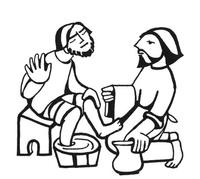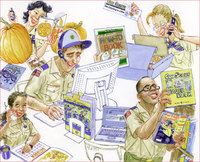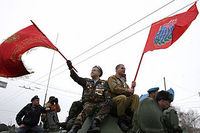 As the Christian world approaches Easter, the scriptures that are read center more and more on Jesus in his final days, as he traveled and taught, working closely with his disciples and followers. A favorite reading at this time of year is the story, written by John the Apostle in his gospel, about Jesus washing the feet of the disciples gathered for the passover meal. (In those days, most travel was on foot, and the roads were dusty, meaning that a day’s labors or journey left one’s feet filthy dirty. Those who were better off had servants to give the evening foot baths.) When one, Simon Peter, protests, Jesus explains that Peter and the others don’t understand why he, the teacher and lord, is doing the work ordinarily done by servants, but soon it becomes clear:
As the Christian world approaches Easter, the scriptures that are read center more and more on Jesus in his final days, as he traveled and taught, working closely with his disciples and followers. A favorite reading at this time of year is the story, written by John the Apostle in his gospel, about Jesus washing the feet of the disciples gathered for the passover meal. (In those days, most travel was on foot, and the roads were dusty, meaning that a day’s labors or journey left one’s feet filthy dirty. Those who were better off had servants to give the evening foot baths.) When one, Simon Peter, protests, Jesus explains that Peter and the others don’t understand why he, the teacher and lord, is doing the work ordinarily done by servants, but soon it becomes clear:
Now that I, your Lord and Teacher, have washed your feet, you also should wash one another’s feet. I have set you an example that you should do as I have done for you. Very truly I tell you, no servant is greater than his master, nor is a messenger greater than the one who sent him.
Thus we are introduced to one of the earliest recorded examples of servant leadership. Continue reading “Servant leadership: Not a new concept”
 As leaders in the Scouting program, we sometimes think that we have the ultimate authority in how our troop runs. But do we?
As leaders in the Scouting program, we sometimes think that we have the ultimate authority in how our troop runs. But do we?




